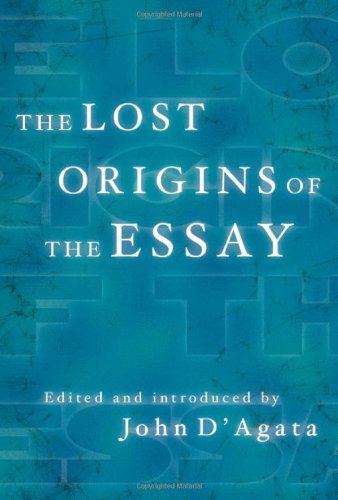“What word is there to describe this kind of logic that sings?”
—Plutarch
Every history is a story, a marshaling of evidence to support a particular reading of the past. Of the Silk Road or Nordic myth. Of Alexandria or pirates or the atom bomb. John D’Agata’s history is of the essay, that redheaded stepchild of literature which, he laments, is often mistaken for “a genre that is merely a dispensary of data—not a true expression of one’s dreams, ideas, or fears.” There is a problem, he argues, with thinking that the nonfiction tradition originates in records of fact, as in how many bushels of wheat a man once owed his neighbor. It denies the genre a tradition as art. “I think this misperception is prevalent today because we haven’t yet laid claim to an alternative tradition.… I am here in search of art. I am here to track the origins of an alternative to commerce.”
This search soars across centuries, continents, and literary forms, from an ancient text by Ziusudra of Sumer to The Pillow Book of Sei Shōnagon to the prose poems of Baudelaire to a “performative essay” on Bob Marley by Kamau Braithwaite to a stunning meditation on love, lust, and the lyric by Lisa Robertson. Along the way, D’Agata carves out a story about the art of nonfiction that is plausible, and possibly even true.
Faced with the fabulous diversity of the pieces collected here, a reader may begin to wonder: What is an essay? Blake’s “The Marriage of Heaven and Hell”? (Surely the poets claim this one.) Borges’s “Tlön, Uqbar, Orbis Tertius”? (Didn’t I just see that in Ficciones?) Artaud’s “Eighteen Seconds”? (Is there a genre for impossible theater?) To complicate matters, some of these “essays” are excerpts from longer works, and others are new translations prepared specifically for this anthology. The skeptic may suspect the editor is tampering with historical evidence. And yet, if you follow D’Agata’s reasoning in the brief introductions that frame each text, you cannot help but see the family resemblance across “a form that’s not propelled by information, but one compelled instead by individual expression—by inquiry, by opinion, by wonder, by doubt… a mind’s inquisitive ramble through a place wiped clean of answers. ”Thought happens; imagination happens; the actions of the mind are events as real as the passing of wheat from one hand to another.
...You have reached your article limit
Sign up for a digital subscription and continue reading all new issues, plus our entire archives, for just $1.50/month.
Already a subscriber? Sign in





